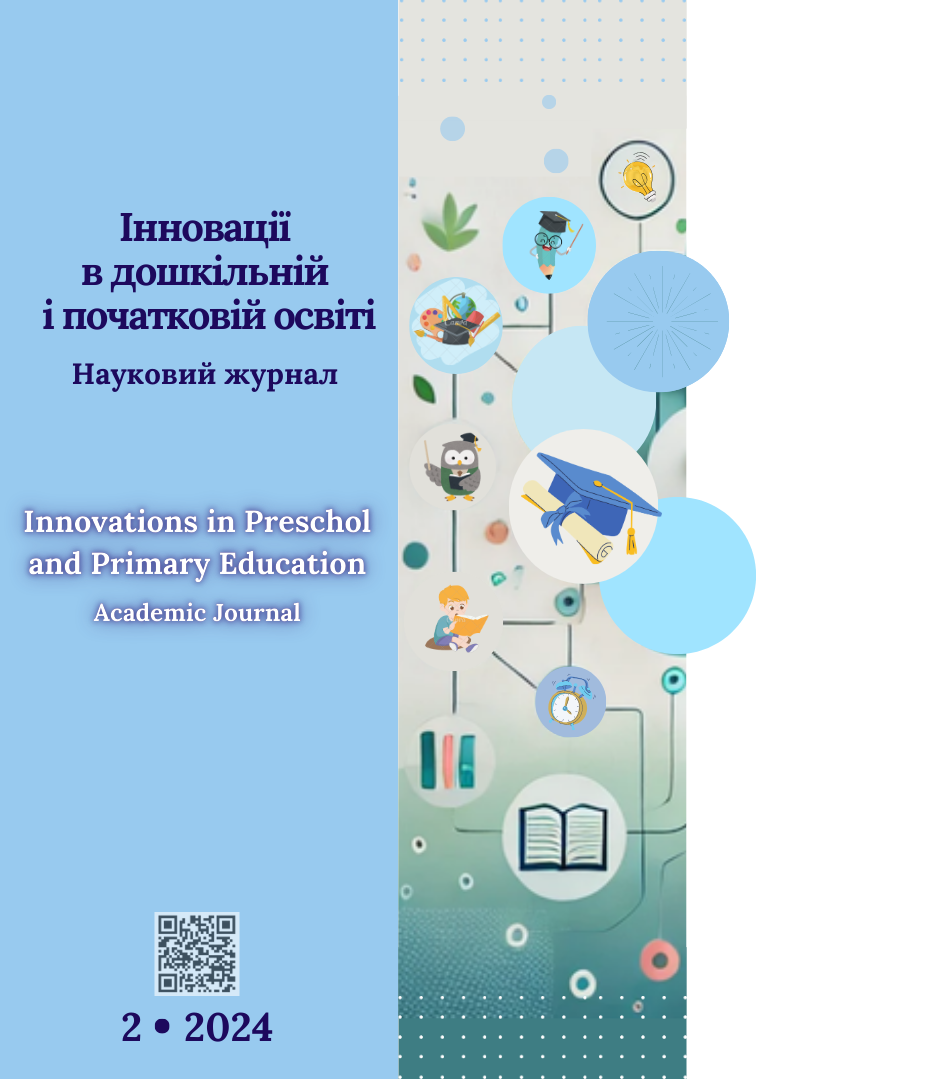Creative and pedagogical aspects of forming innovative competence offuture art teachers
DOI:
https://doi.org/10.31652/3041-2439-2024-2-68-76Keywords:
innovation, competence, art, innovative pedagogical actions, technologies of artistic innovationAbstract
The article raises the question of a competence-oriented approach to the professional training of future art teachers. The analysis of normative educational documents, scientific work of modern domestic and foreign scientists in the field of art pedagogy on the problem of research was carried out. The essence of the phenomena of «innovation», «professional competence», «innovative competence of the art teacher» is characterized. It was found that the concept of «innovation» is considered as an effective tool and leading mechanism of development. Innovations in education lead to overcoming crisis phenomena, are associated with the generation of new ideas, improvement of methods, technologies of education and upbringing, contribute to its development. Professional competence is considered "as a personified property that characterizes the teacher's pedagogical skills and his ability to innovate. It was determined that professional skill is the result of education and self-development, it is an indicator of pedagogical experience, artistic erudition and awareness, formed individual abilities and abilities of the teacher. The innovative competence of a modern art teacher is characterized as an integral construct based on awareness of the value and familiarity with traditional and innovative art-pedagogical technologies; the formed motivational professional worldview position of the teacher-artist; striving to acquaint students with the cultural picture of the world by revealing the codes of artistic and figurative language of works of art by means of innovative artistic technologies; innovative orientation, broad artistic erudition, communicative tolerance, ability to reflect. The results of an experiment to study the motivation of applicants to use innovative technologies while performing creative tasks are presented. It has been proven that the development and inclusion in the content of selective disciplines of the artistic direction of creative integrated tasks that require knowledge of the methodology of applying innovative technologies is effective and justified. The issue of substantiating pedagogical conditions for the formation of innovative competence of future art teachers in the process of pedagogical practice requires further research.
References
Барановська І. Г., Мозгальова Н. Г., Барановський Д. М., Бордюк О. М. Використання засобів ІКТ у процесі дистанційного навчання майбутніх учителів музичного мистецтва. Наукові записки: збірник наукових статей. Київ: Вид-во НПУ імені М. П. Драгоманова, 2021. Вип. 150. URL: http://enpuir.npu.edu.ua/handle/123456789/35295 (дата звернення: 20.08.2024).
Кириленко С. Інноваційна компетентність – важлива складова педагогічної діяльності сучасного вчителя. Молодий вчений. 2023. № 6 (118). С. 42-46.
Княжева І. А. Професійне становлення майбутніх педагогів в умовах університетської освіти. Науковий вісник Миколаївського національного університету імені В. О. Сухомлинського. Серія: Педагогічні науки. 2020. № 1 (68). С. 110-115.
Коваль Т. В., Граб О. Д. Розвиток творчої особистості майбутнього педагога засобами народного музичного мистецтва. Педагогіка формування творчої особистості у вищій і загальноосвітній школах. Запоріжжя: КПУ, 2021. Вип. 74. Т. 2. С. 211-215.
Лазаренко Н. І., Гуревич Р. С., Горохівська Т. М. Компетентнісний підхід як провідний методологічний концепт формування професійно-педагогічної культури майбутніх педагогів в умовах євроінтеграції. Інтеграція в європейський освітній простір: діалог зі стейкхолдерами: колективна монографія. Вінниця: ТОВ «Друк», 2022. С. 4-24.
Масол Л. Загальна мистецька освіта: теорія і практика: монографія. Київ: Промінь, 2006. 432 с.
Мозгальова Н. Г., Барановська І. Г. Емоційно-інтелектуальний потенціал у розвитку творчої особистості вчителя музики. Актуальні питання мистецької освіти та виховання. 2019. Вип. 1-2 (13-14). С. 119-127.
Радченко М. І. Шляхи формування інноваційної компетентності студентів. URL: https:// er.nau.edu.ua/bitstream/NAU/35394/1 (дата звернення: 20.08.2024).
Рекомендація ради про ключові компетентності для навчання впродовж життя (2018/C 189/01). Затверджено від 22 травня 2018 року. URL: https://eur-lex.europa.eu/legal-content/ EN/TXT/?uri=uriserv:OJ.C_.2018.189.01.0001.01 (дата звернення: 20.08.2024).
Старовойт Л. Професійна компетентність майбутнього вчителя мистецтва у системі вищої школи. Актуальні проблеми мистецької підготовки майбутнього вчителя (ІХ школа методичного досвіду) : матеріали Всеукраїнської науково-практичної конференції з міжнародною участю; збірник тез. Вінниця, 2022. С. 329-335.
11. Федорець М., Го Цзюнь. Актуальні питання підготовки майбутніх учителів до формування музичної культури сучасних школярів. Педагогічні науки: теорія, історія, інноваційні технології. 2020. Вип. 8 (102). С. 485-495.
12. Шиман І. А. Сучасні напрями підготовки майбутніх педагогів до інновацій у професійній діяльності. Сучасний рух науки: матеріали Х Міжнародної науково-практичної інтернетконференції. Дніпро, 2020. С. 716-720.
Moskvichova Y., Mozgalova N., Shcholokova O., Baranovska I. Historical Prerequisites for the Formation, Worldview, and Aesthetics of Romanticism: Specificity of the Ukrainian Model. Journal of History Culture and Art Research. 2019. № 8(4). Р. 300-312. URL: https://doi. org/10.7596/taksad.v8i4.2314 (дата звернення: 20.08.2024).

